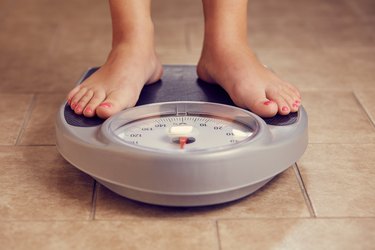
Some people who have irritable bowel syndrome (IBS) may struggle to keep weight on or take it off, but IBS itself is not the real culprit behind this conundrum. Find out how weight, stress and IBS are connected, and the best ways to manage all three.
So, What Is IBS?
IBS is a chronic gastrointestinal disorder that affects up to 45 million people in the U.S., according to the International Foundation for Gastrointestinal Disorders. It affects the large and small intestines, and because some of their functions are regulated by the brain, IBS is often referred to as a brain-gut disorder.
The cause of IBS isn't completely understood, but genetics or past stressful life experiences (like trauma) are thought to play a role.
Symptoms can include cramping, gas, bloating, diarrhea and/or constipation and can range from moderate to severe.
These symptoms can be similar to other digestive conditions, such as celiac or Crohn's disease, so a doctor would need to rule out these conditions before diagnosing someone with IBS, says Sophie Balzora, MD, a gastroenterologist at NYU Langone.
Can IBS Cause Weight Loss?

People with IBS can experience some weight loss, but it isn't an actual symptom of the disorder. Instead, it sometimes happens as these people try to manage the disorder's triggers, including certain foods and stress, according to Harvard Health Publishing.
It's believed that what you eat has the biggest effect on IBS symptoms, so limiting or avoiding certain foods like alcohol, caffeine, chocolate and fatty foods is suggested. Then there are the FODMAPs (fermentable oligo-, di-, and monosaccharides and polyols) — short-chain carbohydrates that may not be digested well and often trigger IBS symptoms.
Adopting a low-FODMAP diet is highly recommended. But if you're completely eliminating certain foods and not under the guidance of a medical professional, unwanted weight loss may occur because you may be cutting too many calories unknowingly.
There's also a psychological and emotional side to IBS that can affect a person's weight. Some people with the condition may begin to fear food, which, according to the Anxiety and Depression Association of America, fuels social discomfort, anxiety, caution and hypersensitivity. All of this stress can aggravate IBS symptoms and could lead to weight loss if the person becomes terrified to eat.
"Often, people with IBS will avoid eating certain foods if they fear they may cause pain and discomfort. Those trigger foods vary with each individual," says Jim White, RDN, registered dietitian and owner of Jim White Fitness and Nutrition Studios. "Stress, rather than a particular food, can also trigger pain. If a patient is under stress, they may choose not to eat as a pain-avoidance mechanism."
Related Reading
How to Manage Weight Loss With IBS
1. Tweak Your Diet
To help manage their weight and make sure they're getting the right nutrition, most experts recommend people with IBS follow a low-FODMAP diet with the help of an expert, per Harvard Health Publishing.
The low-FODMAP diet has two phases:
- First, you eliminate all FODMAP foods for two to four weeks.
- The second phase is gradually reintroducing those foods one by one over six to eight weeks, depending on your tolerance. This helps you figure out exactly which foods trigger your IBS symptoms and which ones you can still enjoy without stress.
"I find with my IBS patients that working on small and frequent meals of tolerable foods can help to keep weight on," says Isabel Smith, RD, CDN, a New York City-based registered dietitian. "Small portions of higher-calorie foods like nut butter, avocado, coconut oil and olive oil (all as tolerated and mixed in) can help boost calories. Smoothies work well, too, to help meet calorie needs."
2. Manage Emotions

Finding ways to deal with stress and anxiety may also help people with IBS manage their weight. Counseling, yoga, meditation and cognitive behavioral therapy are all great ways to help people learn to cope with these feelings.
Related Reading
3. Ask About Medications
Your doctor may also recommend over-the-counter remedies (like fiber, laxatives, probiotics or loperamide) to help ease symptoms so you can eat normal meals without fear, or you may even be prescribed an antidepressant to reduce stress, according to the Cleveland Clinic.
Can IBS Make It Harder to Lose Weight?
On the flip side, many people with IBS have trouble losing weight because they may stick with "safe" foods that aren't all that healthy. Indeed, a study published December 2012 in the Journal of Gastrointestinal and Liver Diseases found that IBS patients often ate unhealthy canned food, processed meats and sweets alongside only some grains, fruits and vegetables.
Unfortunately, many healthy foods that are high in FODMAPs — like wheat products, legumes, cruciferous veggies, mushrooms, yogurt and certain fruits — can trigger IBS symptoms, according to the Academy of Nutrition and Dietetics. In other words, someone will feel "normal" — with no IBS symptoms — eating a plate full of white potatoes instead of a lower-calorie, more nutrient-dense helping of broccoli.
People who have IBS may also avoid exercise, White says, because they don't want to be embarrassed by their symptoms while at the gym or outside where facilities are not available.
How to Lose Weight With IBS

1. Find Healthy Foods That Work for You
Of course, cutting calories while eating healthy is first and foremost when it comes to shedding pounds, per the Mayo Clinic. You can do this — again — by following a low-FODMAP diet and finding out which healthy foods are tolerable, and then replacing your not-so-healthy "safe" foods with them.
2. Add Exercise
Next up: Find a physical activity that's enjoyable and stress-free.
Sure, getting in regular workouts can add to the number of calories you burn each day, but there's another incentive here, too: Exercise has been shown to ease some symptoms of IBS, like constipation, and it can also help with reducing anxiety.
"Focusing on symptom-resolve before weight loss can help promote success from a weight-loss perspective," Smith says.
Related Reading
3. Consider Working With an Expert
For some people, the challenge of losing weight may be an added stressor that ends up making IBS symptoms worse, undermining their efforts.
"One of the hallmarks of IBS is anxiety, and I find focusing on the number on the scale can really exacerbate that anxiety and the condition, too," Smith says. "I always recommend working with an expert — it will make losing weight easier and more effective."
If you're looking for some guidance, try tapping a gastroenterologist or a registered dietitian who specializes in digestive conditions like IBS.
Is this an emergency? If you are experiencing serious medical symptoms, please see the National Library of Medicine’s list of signs you need emergency medical attention or call 911.